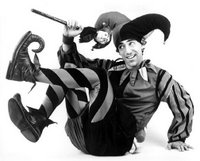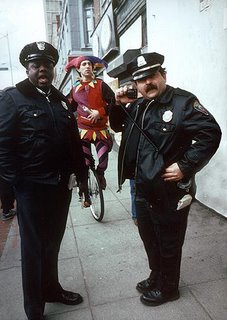7/25/2007
Alexander, King of Jesters, performs all over the world with his hilarious fool act which entertains both kids and adults alike. The New Zealand Herald calls him “Outrageous, offbeat, and full of surprises!” Visit his website at alexthejester.com.
Via email, Alexander King of Jesters responds to general questions about performing in 1998. Thanks for your interest in my opinions on performing. By the way, you guys (S.Y.M. 29) are already doing something cool that many solo performers shy away from or are clueless about. I'm talking about working together. Those of you actively helping each other out in creating better magic are doing something that I believe is very worthwhile. I wish I began 'jamming' with other performers at an earlier age, because it really because it really works at pushing you to grow. Still, it's never too late.
Thanks for your interest in my opinions on performing. By the way, you guys (S.Y.M. 29) are already doing something cool that many solo performers shy away from or are clueless about. I'm talking about working together. Those of you actively helping each other out in creating better magic are doing something that I believe is very worthwhile. I wish I began 'jamming' with other performers at an earlier age, because it really because it really works at pushing you to grow. Still, it's never too late.
These days I feel so charged up after my periodic sessions with other performing artists, that I sing it's praises with gusto.
Questions are great. I' m constantly asking them, beginning with, 'what the heck am I doing here on stage' or 'What's the purpose of this part here?' 'What should this character really look like?' Is this apparel or that comment really agood fit with character? How can you get the feeling of this character across in the shortest amount of time?' If your costume and your walk onto the stage gets your character across in just a few seconds, you've struck gold. Does the audience quickly get a sense that you are elegant? Goofy'! Bizarre? Witty? Hip? Lovable' Pathetic? Unassuming? Psyche? Nerdish'! Kid next door? Angry? Sweet? What can you play convincingly?
If you don't know the answer, ask that question while looking at yourself in the mirror. Pretend you never saw yourself before. Or else ask that question while looking inside yourself. Choose an intention, and stick with it! Then go as far as you dare. Gather your nerve and go even further!
I'm not saying that an outrageous personality is the goal, although that can be good. Calm is great too. Almost any choice is great if you commit 110 %. Audiences care less about what you do. They care more about who you are.
Why not cut the weakest trick in your act and then develop what's left a little deeper. This takes a little work. In fact, I'll venture to guess that younger artists keep adding and acquiring new bits and routines to their performances. It's natural. Then comes a time when they get a little surer of their character, and then finally there are some artists who spend the rest of their careers paring down. They are concentrating on the few things that really make sense for themselves.
Here's a question that I've been asking alot lately. What is the emotional response I want from my audience at that particular moment? Sometimes it can even change from moment to moment and when it does, I find that very satisfying.
Top 40 radio hits may sound lame sometimes, but ask yourself, do these hits grasp an emotion? I think that's what usually gets the song on the airwaves. I think a good variety performer captures a feeling or sentiment too. Music, costuming and props can either work together in harmony toward this end or they can contradict each other. Use what you've got and ride that spirit to where it takes you.
You don’t go on stage unless you think you have something special to share, right? If you trust yourself enough to do that, than why just throw it at people in a hurry? All of us in the audience will lean a little closer and be more attentive if you purposely share a moment with your audience on stage before you begin your ‘schtick’. This is an under-utilized showmanship principal: Before you start, let the audience check you out. Hit your mark on stage or in front of the microphone or wherever, and then just wait. Look at the audience and let them look back. The audience is composed of humans, and humans are really just another warm-blooded animal. Like all warm-blooded animals, when we meet a new one right in front of us, we gotta look at you and then sniff! I’m serious! Let us fill our eyes with your visage, let us breath in your scent (symbolically, of course!) After this little break, a breath or two, perhaps an exchange of glances, we trust you more and then relax. We tune in. As and added bonus, the longer that you intentionally wait before starting, the greater is the intrigue that you build in the audience.
The same principal is true when it comes to taking your bow. This is even harder, especially if you are a soloist. How often have you seen a solo act begin doing his or her next bit while people are still applauding the last bit? It is soooooo common! I‘ve been working a very full-time schedule for years and I still catch myself doing it. What’s the hurry? I think half the time when we rush applause, what is going on in our head is a little dialogue that goes something like this: “Thank you. You’re too kind! It’s just little ol’ me up here, and I’m not an egomaniac, so I will rush to my next thing quickly before you lose interest in my act” This is bogus! But so often we feel pushed to rush to the next thing. A video of your performance is an excellent way to find spots in your act where you might be doing this. Please do not confuse accepting applause with begging for applause. This is probably just a personal peeve, but I hate watching a magician do a trick and then immediately bend over in a bow and say “Thank you very much” or else make an ad-lib that goes something like: 'yes, when I first saw that trick, I was too stunned to applaud myself' This may be excusable if you’ve got a dead crowd and trying to liven them up early in the show. Or if you are performing outdoors and you’re trying to bind the passersby into a tight and lively unit. But most of the times I think this is a weak move, especially if done repeatedly. A solid performance that ends in a punctuation mark (which will require that all-important pause!) will earn you spontaneous applause. That’s a promise. Even a less than solid piece can get spontaneous applause if you put great care into your the way your character acts at it’s concluding moment. This gets you booked at The Ritz. Begged applause gets you Motel 6. So have the courage to wait. Leaving space in a performance is magic. Ahhh “space the final frontier!!”
Finally, let’s come back to solo performers benefiting from outside help. This stuff we’ve been discussing about character and showmanship is not really part of any school curriculum that I know of. Variety performing is not a college subject yet. I know of only a few small schools in Europe and one in California that even touches on this stuff. Experience is the main teacher here. But don’t underestimate the benefits of both apprenticing and mentoring. I see this happening at the SYM already and applaud. Personally I have am both an apprentice and a mentor and will continue to be, I hope. Fortunately, the Boston area has more than it’s share of full-time variety artists. There are many artists here who are more than willing to mentor if the conditions are right. David Oliver or myself can steer you to them. Meanwhile, I still carry the bags of those artists who inspire me!!
Well, you happened to ask me about one of my favorite subjects, and I happened to have just been discussing this when I read you’re E-Mail. As you know, I usually don’t actually speak during my show. This reminds me of a quote from Marcel Marceau, “The reason that mimes don’t speak is that if given the chance, they just won’t shut up!”
Best wishes with your many efforts,
--Alexander
visit Alexander's site at alexthejester.com



1 comments:
This is a brilliant piece of work! It should be required reading for all performers! I am not just saying this because he is my brother. :)
Post a Comment